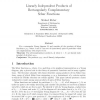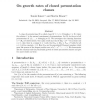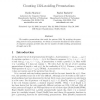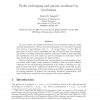COMBINATORICS
2002
15 years 2 months ago
2002
COMBINATORICS
2002
15 years 2 months ago
2002
162
Voted
COMBINATORICS
2002
15 years 2 months ago
2002
Erdos, Rubin, and Taylor found a nice correspondence between the minimum order of a complete bipartite graph that is not r-choosable and the minimum number of edges in an r-unifor...
121
click to vote
COMBINATORICS
2002
15 years 2 months ago
2002
Fix a rectangular Young diagram R, and consider all the products of Schur functions ssc , where and c run over all (unordered) pairs of partitions which are complementary with re...
109
click to vote
COMBINATORICS
2002
15 years 2 months ago
2002
Let s(N) denote the edge length of the smallest square in which one can pack N unit squares. A duality method is introduced to prove that s(6) = s(7) = 3. Let nr be the smallest i...
COMBINATORICS
2002
15 years 2 months ago
2002
97
Voted
COMBINATORICS
2002
15 years 2 months ago
2002
We consider permutations that avoid the pattern 1324. By studying the generating tree for such permutations, we obtain a recurrence formula for their number. A computer program pr...
COMBINATORICS
2002
15 years 2 months ago
2002
A 321-k-gon-avoiding permutation avoids 321 and the following four patterns: k(k + 2)(k + 3)
117
click to vote
COMBINATORICS
2002
15 years 2 months ago
2002
Let In() denote the number of involutions in the symmetric group Sn which avoid the permutation . We say that two permutations , Sj may be exchanged if for every n, k, and order...






